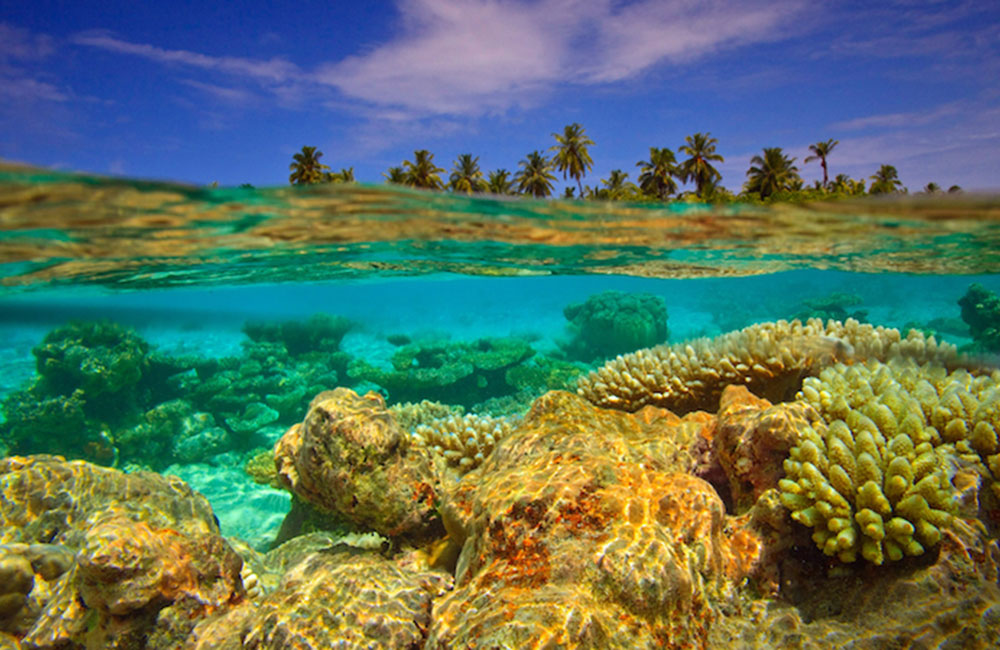Alongside the famed Great Barrier Reef, the Maldives is also home to some of the most enchanting and diverse coral reefs in the world, its crystal clear waters bursting with colour and life.
However, since 2014 this tropical paradise has been struck by severe coral bleaching, affecting between 60 percent and 90 percent of its coral, depending on the area.
Rising temperatures
Corals become bleached when under stress because of changing conditions, such as rising seawater temperature. This causes the coral to expel the algae living in its tissues, turning white.
The coral is not dead, but it is starving, as the algae provide up to 80 percent of its nutrients. Prolonged higher temperatures can kill the corals completely, with a cascade of negative effects on the many species that depend on them, including the human communities that they support.
Bleaching episodes typically last one year, but the most recent has been going since 2014. Australia's Great Barrier Reef has also been affected, with more than two-thirds of it experiencing "shocking" amounts of bleaching.
"In 2014 reefs around the world were hit with one of the worst coral bleaching events on record", said Thomas le Berre, a French coastal oceanographer who is responsible for some of the top environmental projects in the Maldives.
The previously vibrant corals, which help attract over one million tourists a year to the archipelago, have turned into a ghostly shadow of their former self.
Le Berre says part of the blame goes to El Niño, a cyclical weather event that takes place every few years resulting in warmer waters passing through the Pacific and the Indian Ocean. Combined with global warming, it has seen water temperature reach new highs of 34 degrees in some area, causing the corals to go beyond their thermal limit, which results in bleaching and sometimes death.
A study conducted by the University of Exeter confirms that, as a result of a strong El Niño in 2016, an increase in surface ocean temperatures has led to a major coral die-off in the Maldives. It has also found that some species of fish, particularly parrotfish, are eroding the reefs more intensely following the bleaching event.
Coral nurseries
According to Le Berre, although bleaching is "quite low on the government's list of priorities" he is working closely with them with them to ensure it is on their agenda. His project, the Reefscapers Coral Reef Restoration programme, aims to make the Maldivian reefs resilient to these changes in temperature and increase their rate of regeneration.
Using metal frames, small branches of coral can be attached and spread out to create 'coral nurseries'.
Corals compete for the nutrients in the immediate environment around them, so by spreading them out, they can recover faster. Using this method, researchers here have seen a four-fold increase in growth rates, over an array of about 560 frames.
Lost habitat
Recovery can take a long time. The last severe bleaching event was in 1998 and it took almost 12 years for the reefs to recover.
Worryingly, the bleaching affects not just corals: "Habitat for small fish is also lost," said Shiham Adam, the Maldives' Minister for Fisheries and Agriculture.
Great Barrier Reef 'cooking and dying' as seas heat up, warn scientists
"Long-nose hawk fish feed exclusively on live corals, and they are now almost gone. Butterflyfish abundance also is gone."
The Four Seasons and The Banyan Tree in the Maldives are both leading the charge, with their own team of researchers leading coral recovery programs: "it's very difficult for us to monitor the coral bleaching so it's important for us to work very closely with some of the resorts," sad Thoriq Ibrahim, Minister of the Environment.
But some relief most come from a more global perspective: "The Paris Agreement was a huge milestone for us in progress to minimizing global warming," Ibrahim added.
"This is what we need to happen in order to save our reefs."
Source : CNN

Leave your comments
Login to post a comment
Post comment as a guest